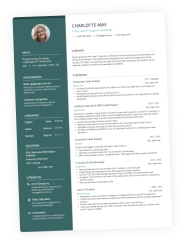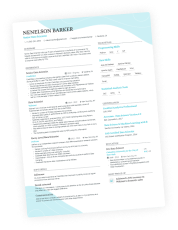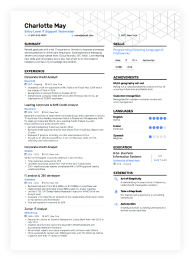Have you ever wondered what harm a little white lie on your CV could ever do? As the saying goes, ‘Oh, what a tangled web we weave / When first we practice to deceive’.
Getting caught in even an innocent lie can, at best, seriously undermine your credibility in a job interview. At worst, like many others before you, you can lose your job and, in some cases, even face prison time.
Hands down, the best choice is not to initiate the employee-employer relationship based on a lie. But sometimes, your only option is to mitigate the situation once the lie has been uncovered.
In this article, we:
- Discuss the temptation and rationale behind lying on a CV
- Explore scenarios where you might get caught lying on your CV
- Look at the consequences of getting caught in a lie on your CV
- Look at when you might fudge the truth with white lies
- And offer advice on how to craft a compelling CV that doesn’t need any lies to shine!
The temptation to lie
Sometimes, it can be tempting to embellish or outright lie about professional orpersonal details on your CV. Different pressures can prompt these lies, but understanding them can help you avoid this trap.
The most common reason to lie is competition. The job market can be daunting when hundreds of qualified candidates sometimes fight for the same position.
The fear of being overlooked or overshadowed has pushed many job-seekers to exaggerate their skills or experiences to gain a competitive edge.
Personal insecurities can also prompt dishonesty on a CV. People often doubt their abilities or qualifications, especially when comparing themselves to imagined competition.
People with self-doubt can find it hard not to embellish theirworkplace achievements to appear more competent and desirable to potential employers.
Similarly, perceived professional expectations can fuel the temptation to lie on a CV. There may be a prevailing belief that specific qualifications or experiences are prerequisites for success in a particular role.
In response, people entering an industry - even people with great experience - may feel compelled to embellish or fabricate parts of their CVs. In their minds, lies may be the only way to improve their job chances.
Finally, desperation can drive a person to lie on their CVs. The pressures and stresses that come along with unemployment can often cloud a person’s judgment, leading to ethically questionable decisions.
It’s easy to imagine how the pressure to provide for oneself and a family could compromise someone’s ethics. This unfortunate situation has compelled more than one person to fabricate details on their CV in the hopes of quickly securing employment.
Ethical considerations
Regardless of the motivations, it’s important to consider the ethical facets of lying on your CV.
Dishonesty
Misrepresenting qualifications, experiences, andjob descriptions on a CV undermines the employer-employee relationship. It can lead to mismatches between job requirements and employee capabilities, resulting in dissatisfaction and poor performance.
Being dishonest can also raise suspicion among your coworkers. Eventually, this could strain workplace interpersonal dynamics, leading to a lack of cohesion and team underperformance.
Lying on your CV may also have trickled-down effects that impact future job seekers during the recruitment process. It can perpetuate a cycle of dishonesty and mistrust.
Left unchecked, this cycle will undermine the values of fairness, transparency, and meritocracy that are the basis of a healthy and productive work environment. These outcomes hinge on every employee's choices every day, including you.
Integrity
On the flip side, workplace integrity fosters trust and builds strong professional relationships. When someone demonstrates honesty, transparency, and accountability in their actions, they earn their colleagues' and superiors' respect and trust.
This trust leads to effective communication, collaboration, and teamwork, improving morale, productivity, and job satisfaction. This creates a virtuous cycle where honesty and integrity are valued and rewarded, cultivating a more harmonious and ethical workplace.
Getting caught in a lie during the interview
Getting caught in a lie during a job interview is a tough nut to swallow. If not handled properly, it can trip you up and raise major red flags for a recruiter, ruining your chances for consideration.
Not surprisingly, employers value honesty and integrity in their employees. Discrepancies between the information you include in your CV and the answers you give in an interview will sound alarm bells that you are not the type of employee they want.
If you have lies on your CV, you should first adjust it to reflect the truth. If you’ve sent it out already, look at the discrepancies and think about how to honestly answer questions about them while highlighting positive characteristics.
This way, if you’re faced with questions about inconsistencies during an interview, you’ll stay calm and be prepared to be honest and transparent about them. Being evasive or trying to hide the truth will do even more damage, so this is your best option.
How to respond to questions about CV discrepancies
Be honest if a recruiter asks you about a discrepancy on your CV. Taking responsibility for any inaccuracies demonstrates integrity and accountability, qualities that any potential employer will value highly in potential hires.
Acknowledge any discrepancies upfront and provide honest explanations for them.
Rather than dwelling on past misrepresentations, emphasise the qualifications, achievements, andvaluable work experience you’ve gained through your career.
To respond truthfully while presenting yourself in a positive light, highlight relevant skills and experiences that make you a strong fit for the role. Redirecting the conversation toward your strengths and capabilities will reinforce the value you bring to the role.
Accepting responsibility
As hard as it may be, candidates must own up to their mistakes and demonstrate accountability during the interview process. This includes acknowledging past misrepresentations on your CV and explaining the lessons you learned from those experiences.
It’s not a silver bullet, but showing humility and a willingness to learn from your mistakes is your best chance to reassure employers of your integrity and commitment to ethical behaviour in the workplace.
Professional consequences of CV Lies
Getting caught lying on your CV, during the hiring process, in an interview, or after you’re hired can have severe professional repercussions.
The most immediate thing likely to happen is that you’ll be removed from consideration for the job you’re applying for and likely any other position with that company ever. This is known as being “DOA” or dead on arrival.
Employers want people on their teams whom they can trust. If they catch you in a lie before they’ve hired you, they’ll likely cut ties before suffering any potential future losses a dishonest employee might cause.
Lying on your CV can also damage your professional reputation beyond that company. People talk to others in their industry, and gossip like that can get around.
If that happens, you’ll find securing a job in your field much harder, hampering your job prospects and career advancement opportunities.
But the potential damage doesn’t end once you’re hired. The repercussions get more severe.
Employers have the right to immediately dismiss an employee they catch lying on their CV, without notice or compensation. The financial and professional consequences of this will vary from person to person, but will always be a setback.
There can also be legal consequences, particularly if the misrepresentation is related to mandated or legally required qualifications and certificates. Regardless, lying on your CV can constitute fraud, and employers can take legal action to recover any related damages.
Lying on your CV and the Law
Lying on your CV might seem tempting, like a shortcut to securing your dream job, but the repercussions can be severe. The impact can go far beyond professional embarrassment, with potential legal ramifications that could impact the rest of your life.
Before you make that mistake, take a look at the possible repercussions:
Fraud charges
Misrepresenting information on your CV to deceive potential employers can constitute fraud. If your dishonesty leads to financial gains, like securing a job or promotion,you could face legal action under fraud laws.
Breach of contract
When you're hired based on false information provided in your CV, itcould be viewed as a breach of the employment contract. If your employer discovers the deception, they may have grounds to terminate your employment.
Dismissal
Employees who lie on their CVscan be dismissed immediately without notice or compensation, especially if the falsehood is material to the job role.
Legal action
If your employer incurs losses or damages as a result of your dishonesty, they may choose topursue legal action against you. This could involve seeking compensation for any financial losses suffered due to your deception, which may result in your imprisonment for up to 10 years..
Mitigating past lies
Unfortunately, lying on your CV is tricky to come back from, which is why we advocate always being honest. If you have, the only way out of the lie is to face it with honesty and a sincere willingness to make amends.
During the interview process
If questions about inaccuracies in your CV come up during the interview process, you should be honest, take responsibility for them, and explain to the interviewer what happened. Hiding the truth will seem even shadier, further damaging your credibility and hurting your chances.
Instead, get ahead of things upfront by acknowledging any misrepresentations you’ve made in your CV. Let the recruiter know you are genuinely remorseful for your actions.
Then, if they’re open to continuing the interview, highlight the genuine qualifications and experiences you have that make you a great candidate for the role.
Once you're hired
You're in a sticky situation if you lied on your CV and got a job. On one hand, being honest at this point could get you fired. On the other, you’ll almost certainly be fired if someone finds out you’ve been lying.
Before it’s too late, you should come clean to your employer. Honesty is the best policy and the only way to maintain professional credibility.
Admitting to having exaggerated or falsified parts of your CV will at least demonstrate you’re accountable for your actions. And while there may still be some fallout, this is the only way to ensure there won't be a meltdown later with potentially much more severe consequences.
After being hired
If you’ve held your position for a while, but your hire was based on some falsehoods, it’s a good idea to take proactive steps to clear the air. You do risk termination, but being honest is the only way to solve the problem.
You may be able to mitigate things by proactively completing thecourses andcertifications on your CV, or by taking other steps that meet your claims. This will show your employer that you are accountable, capable, and willing to learn the skills you claim to have.
Grey areas: Common "white lies" on CVs
While we suggest you always be honest when crafting your CV, sometimes the ‘truth’ can be a matter of perspective.
For example, consider the statement, “I had an apple for lunch”. Then consider what that means for four different situations: you had a royal gala apple for lunch, you had apple sauce for lunch, you had apple pie for lunch, and you had a hard apple cider for lunch.
In the first case, we might say there’s a ‘lie of omission’ but no untruth, and in the second, the ‘white lie’ is still pretty innocent. But we can agree that apple pie is not an apple, which is manipulative and deceitful. And, well, hard apple cider? We’ve just crossed into ‘lie’ territory.
When crafting your CV, you have to navigate the grey areas of what constitutes acceptable embellishment and what crosses the line. Ultimately, the goal is tosell yourself with your CV, but it has to be you, so let’s look at some scenarios we commonly encounter in the real world.
Inflated job titles
It's not uncommon for people to reword previous job titles to make them seem more impressive. But caution: there's a fine line between embellishing and misrepresenting your job titles.
Stretching employment dates
It’s common to adjust employment dates to hide short periods of unemployment or smooth job transitions. However, it’s also easy to slip into ‘fabrication’ territory, where a quick phone call or email can unravel your story and ruin your chances.
Exaggerated achievements
Showcasing your accomplishments is essential, but claiming achievements beyond your capacity or contributions is problematic. You could be exposed during the recruitment process, or even more embarrassingly, on the job when you can’t do what you claim.
Layoff vs. fired
You know why you no longer hold a particular position, and it’s your responsibility to be forthright about it. Sidestepping details like this in your interview will raise a red flag, and being fired can be a deal-maker if you highlight what you learned from it and since then!
Volunteering
Including fake volunteer experience on your CV is deceptive, and in cases where it makes a difference, it can and likely will be easily verified. Genuine volunteer work demonstrates valuable skills and character traits while lying about it proves the exact opposite.
Strategies for Truthful CVs
A compelling CV will open the door to an interview that leads to your perfect job. And writing a persuasive CV is ultimately about honesty, authenticity… and a few good tactics.
Follow these simple strategies to start writing you’re your winning CV:
Lead with a summary
Start your CV with a strong summary highlighting your key skills, experiences, and career goals.
Focus on transferable skills
Emphasise key skills you have that are relevant to the role you're applying for regardless of whether you got them in another industry, school, volunteer work, or anywhere else.
Highlight achievements
You don’t have to exaggerate or fabricate accomplishments. Focus on tangible achievements from your past roles, using action verbs for dynamic text, and include quantifiable results to show your impact.
Tailor your CV
This is such a powerful tool.Customise your CV for each job you apply to by aligning it with the job description, showing employers your genuine interest and qualifications for the role.
Address gaps
Don’t highlight these, but if you have gaps in your employment history, be transparent about them. Include and prepare a brief explanation for the gap and highlight how you used that time to develop personal or professional skills.
Flip weaknesses into strengths
Use the areas you need to work on as opportunities to showcase how adaptive and willing to learn you are. Show employers you can and want to overcome challenges, and that you’re taking proactive steps to improve your professional toolkit.
Ask for help
Consider working with career coaches, resume writers, or mentors who can provide valuable insights and feedback on your CV. We have amazing career counselors who’ve helped thousands of people and we’d love the opportunity to work with you.



